Final Fantasy 10's new look betrays its main character
Spoilers for Final Fantasy 10/10-2 HD Remaster follow.
By all rights, I should be happy that Final Fantasy 10 has finally been released on PS4. In many ways I am - I've adored the game since its original launch let's not talk about it years ago, and though we just saw the game return on PS3 last year, anything that makes the vibrant world of Spira even more available to a new generation of players is worth celebrating. But I'm still not entirely happy. I can't be, for a reason that the folks behind 10's Remaster may not have considered, but I feel should stand as a warning to anyone updating a beloved piece of gaming history: I hate Yuna's new face. So goddamn much.
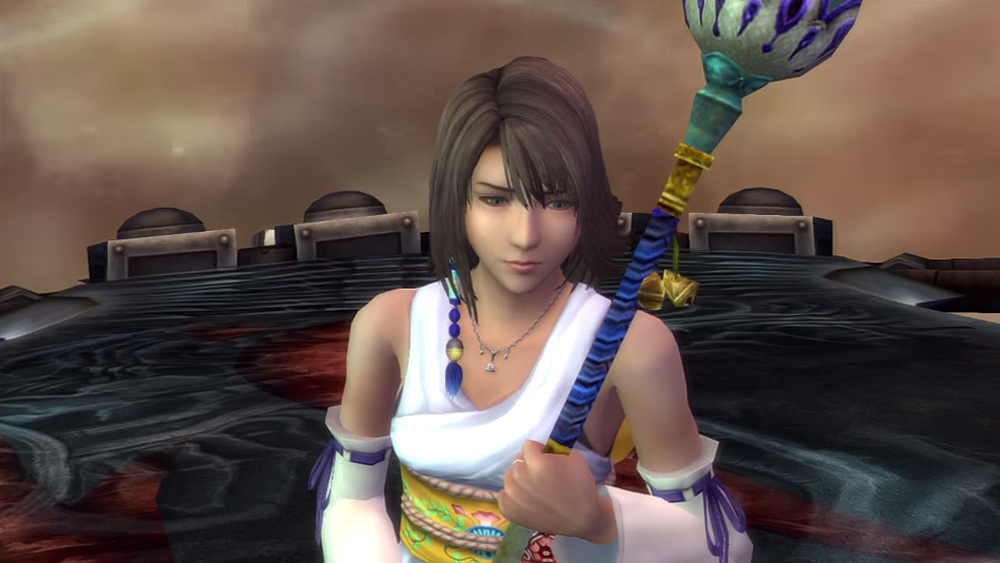
To be clear, this isn't a criticism of Yuna herself, because I adore her. The soft-spoken leading lady of FF10 is a woman of conviction, utterly focused on saving the world even at immense personal cost. She's the game's true main character and its driving force - Tidus may be on the cover, but he's the point-of-view character, the Watson to her Holmes. Her deep religious faith isn't something she adheres to thoughtlessly, and she's willing to walk away from everything she's ever known when she discovers the church that housed and trained her has long-since become corrupt.
In the original game, that showed on her face: where her voice work failed, her expressions conveyed impressive stews of emotions, like the fear and determination she feels when confronting an idol she discovers has betrayed her. It's brilliant visual storytelling, and watching her struggle with conflicting feelings and come out on top creates some of the game's most powerful scenes, and defines her as a character.
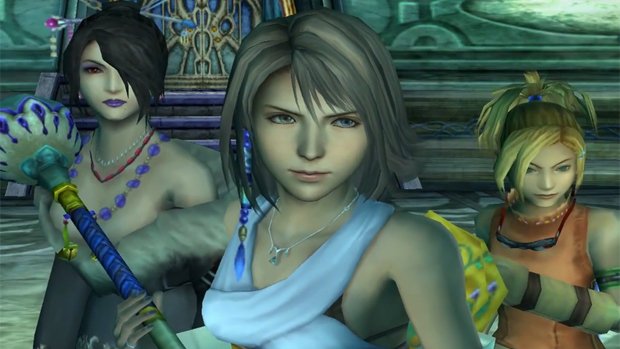
But something about her changed in the (otherwise worthwhile) Final Fantasy 10/10-2 HD Remaster, and for reasons that aren't at all malicious. In an effort to make FF10's cast match the game's updated look, developers changed the character models to look prettier and smoother in comparison to their rough-hewn former selves. The thought is reasonable, but unfortunately results in characters that often look unnaturally doll-like, with a narrower range of facial expressions than in the original game. Usually that isn't a big deal, particularly during in-game cutscenes where their faces never moved in the first place. But during moments where non-verbal cues are key to getting the characters' feelings across, smoothing out the wrinkles that make up emotion ends up cutting out some of the best parts of really important scenes. And nobody suffers from that more than Yuna.
It's not immediately obvious early on, even if she does look rather doe-eyed on occasions that should warrant serious vigor. But it starts to become a problem midway through the game, when she confronts a treacherous official of her church. While she attempts to reason with him, she's willing to respond with force when he threatens her friends, and the obvious intensity in her face gets that point across clearly in the original. However, the Remastered edition mutes her expressions, so she looks sad and scared, rather than a woman steadfast in her conviction. It's fine for a character to be upset while murdering an important political figure, but the fact that her facial features suggest fear above all else completely changes how she appears in that scene, so her characteristic strength is lost.
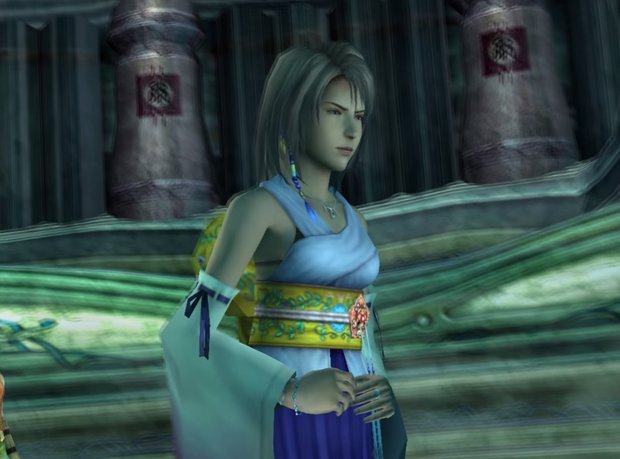
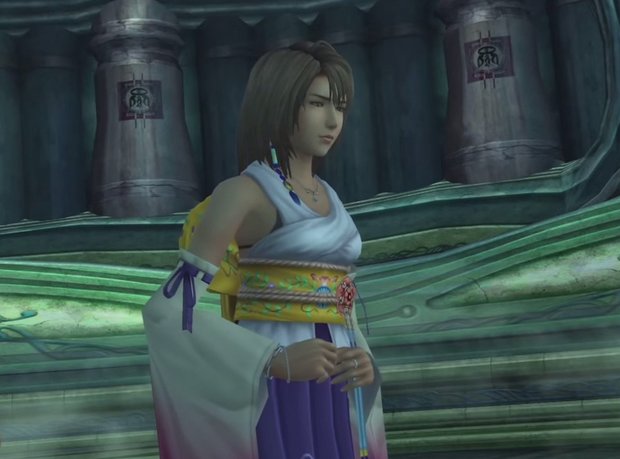
This might seem like a minuscule thing to complain about in the long run (are the configuration of a single character's eyebrows really a big deal?) and developers at Square probably didn't pay it much mind while transforming FF10 for the modern gaming market. But small changes like this can have a big impact on the overall product, which minds within Square know well; according to Final Fantasy producer Yoshinori Kitase, one of his concerns about releasing a FF7 HD remake is that developers will want to 'fix' aspects of the game that fans appreciate as-is. In an honest effort to improve an already great product, developers can end up making sweeping changes that affect other, less obvious but still important parts of the game in unexpected ways.
Sign up to the GamesRadar+ Newsletter
Weekly digests, tales from the communities you love, and more
While the trade-off in FF10 might look small - a few facial tics for top-notch visual quality sounds like a good deal - it ends up erasing those critical indications of Yuna's strength, and ultimately ruins one of the game's greatest scenes. After a lifetime of service to the church, she discovers that not only are its officials corrupt, but its prescribed method for saving the world will actually lead to an ongoing cycle of destruction. Instead of making life easy for herself and going along with it, Yuna rejects the church's ideology entirely, basically giving her world's morally dubious version of Jesus the middle finger in the process. The scene is an ultimate show of her conviction and an inner power that lets her say no to 1000 years of tradition and an all-powerful god. And in the original and Remastered editions, that sort of power looks like this:
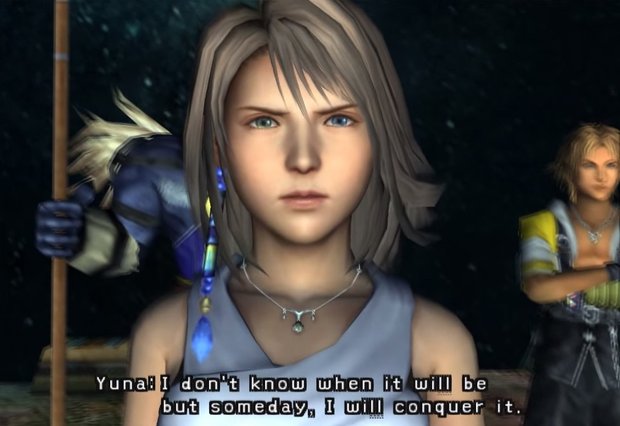
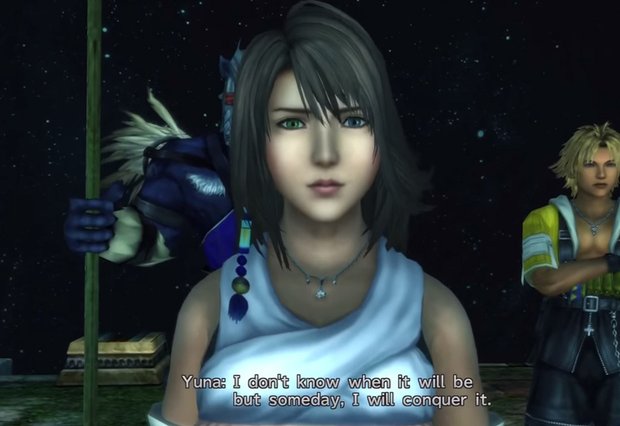
While the original game lets Yuna's face show all the sadness, anger, and sense of rebellion that the scene demands, in the Remaster she's stuck with confusion and docility. Her words are still there, but they don't have nearly the impact they should, because even she doesn't seem convinced by what she's saying. If Yuna in the original is the powerful savior of a world that doesn't deserve her, Yuna in the Remaster is a nervous preteen giving a speech in front of her English class that she forgot to practice. As small as they may sometimes seem, facial expressions can make or break a performance, and Yuna's lack of emotiveness in the Remaster ruins what should be a defining moment of strength.
I should note that I'm not making this point to call out Square in particular. While I wish the Remaster's development team had prioritized what Yuna's face does in addition to what it looks like, this isn't a problem unique to one studio. In the rush to recreate old classics in a way that capitalizes on modern tech, many developers run the risk of leaving critical parts of their original games' spirit by the side of the road. Making sure that doesn't happen requires careful attention to detail, and for some developers who just want to put their product in front of a wider audience, taking the time to ensure loyalty to the original isn't a priority. But when the result is a recreation that doesn't honor those things that make the original great (both big and small), old fans and new arrivals alike lose out.
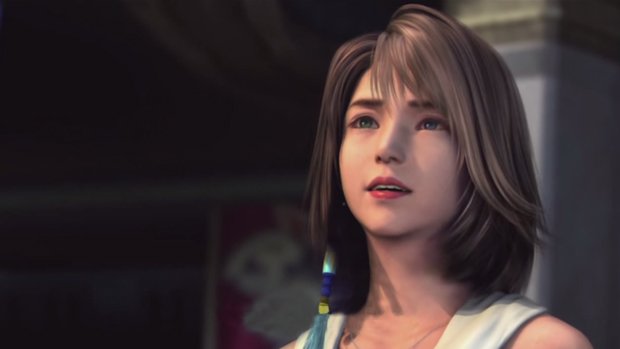
It's in everyone's best interest for fans to recognize games that balance new updates with thoughtful adherence to the original titles, and for developers to keep the little things in mind when recreating a game so great they want to show it off all over again. In FF10's case, I'm largely content in the fact that Yuna's still the same person in the new edition, and her personal choices, her dialogue, and the way she directs the narrative remain the same. However, the downplaying of her facial expressions, and the resulting reduction of her strength, means a significant piece of her character is suddenly gone. I sincerely hope that players who only experience the Remastered version can still see the greatness I found in her back in the day. But I can never be sure.
Former Associate Editor at GamesRadar, Ashley is now Lead Writer at Respawn working on Apex Legends. She's a lover of FPS titles, horror games, and stealth games. If you can see her, you're already dead.



